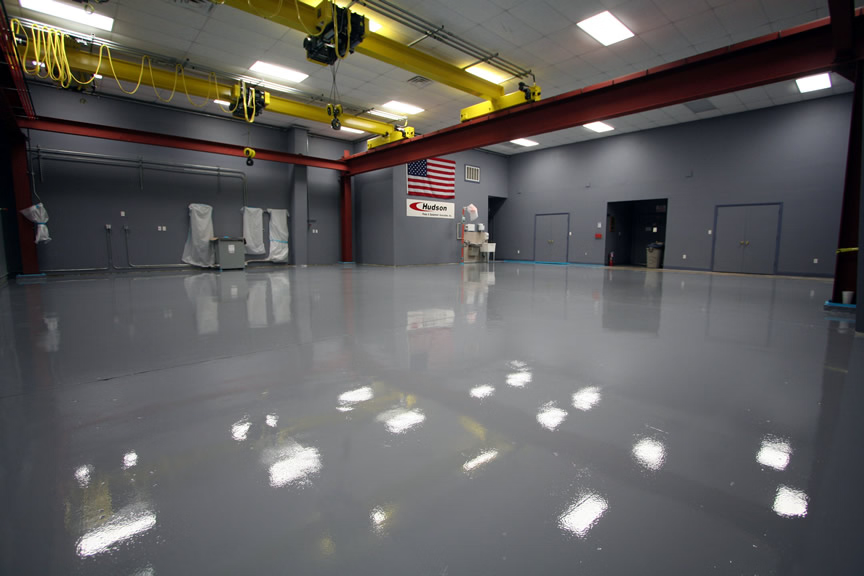Commercial floor coatings are essential for protecting high-traffic surfaces in offices, warehouses, restaurants, retail stores, and more. They add durability, aesthetics, and safety to spaces that experience constant wear and tear. But a common question that business owners and facility managers often ask is: how long do commercial floor coatings last?
The lifespan of a floor coating depends on factors like coating type, substrate condition, traffic, and maintenance. If you’re in River Forest IL, and need expert help, contact Babcock Restoration for professional commercial floor coating services.
What Determines the Lifespan of Commercial Floor Coatings?
The average commercial floor coating can last anywhere from 5 to 20 years, depending on the materials and maintenance involved. Here are the main factors that influence how long your coating will last:
1. Type of Coating Used
Different floor coatings offer varying levels of durability:
- Epoxy Coatings: Typically last 7–10 years in commercial settings. They’re strong, chemical-resistant, and commonly used in warehouses and garages.
- Polyurethane Coatings: More flexible and UV-resistant than epoxy, often lasting 10–15 years, especially in areas exposed to sunlight.
- Polyaspartic Coatings: Fast-curing and highly durable, these can last 10–20 years with minimal maintenance.
- Acrylic Coatings: More affordable, but they may only last 1–3 years, making them less ideal for heavy-duty commercial use.
2. Level of Foot and Equipment Traffic
Heavy machinery, forklifts, or constant foot traffic will naturally wear down coatings faster. High-traffic environments may need recoating more frequently, regardless of the type used.
3. Exposure to Chemicals or Moisture
If your commercial space uses harsh chemicals or experiences regular spills (like in a commercial kitchen or auto shop), coatings may degrade faster. Chemical resistance is a major factor in choosing a coating system.
4. Surface Preparation Quality
The lifespan of a floor coating is significantly affected by how well the concrete surface was prepared before application. Poor surface prep can lead to premature peeling, bubbling, or cracking.
5. Maintenance and Cleaning Practices
Routine cleaning and prompt spill management will help your floor coating last longer. Avoid abrasive cleaning tools and use pH-neutral cleaners when possible.
Ways to Extend the Life of Commercial Floor Coatings
If you’re investing in a high-performance coating, you want to make sure it performs for as long as possible. Here are some practical tips:
- Clean spills immediately to prevent staining and chemical breakdown.
- Use floor mats at entrances to reduce dirt and debris.
- Apply wax or sealants (if compatible) for added surface protection.
- Schedule regular inspections to address minor damage before it spreads.
- Avoid dragging heavy machinery or furniture across coated floors.
- Use appropriate cleaning solutions recommended for your specific coating type.
When to Recoat or Replace Your Commercial Floor Coating
Even with great care, all coatings will eventually show signs of wear. Here are the most common signs that it’s time to recoat:
- Visible scratches, cracks, or chipping
- Discoloration or dullness, especially in high-use areas
- Peeling or flaking near corners or seams
- Loss of slip-resistance or traction
- Water or chemical stains that won’t clean up
Planning for a recoat before major damage appears can save time and money on repairs.
Choosing the Right Coating for Longevity
Selecting the correct coating for your specific industry and usage level is essential. For example:
- Retail stores may prefer polyurethane for its attractive gloss and UV resistance.
- Warehouses often use epoxy for its strength and load-bearing capacity.
- Medical and food service facilities opt for coatings with antimicrobial and slip-resistant properties.
- Parking garages or exterior surfaces may need UV-resistant polyaspartic coatings.
Talk to a floor coating specialist to match your environment with the best-performing product.
Final Thoughts
So, how long do commercial floor coatings last? The answer depends on multiple factors, but with the right coating, proper application, and ongoing care, you can expect your floors to remain strong and attractive for up to two decades. Regular maintenance and choosing the right product for your facility’s needs can significantly increase the return on your flooring investment.
Frequently Asked Questions (FAQs)
1. What is the longest-lasting commercial floor coating?
Polyaspartic coatings are among the most durable, lasting up to 20 years with proper care.
2. Can I recoat my floors to extend their life?
Yes. Recoating can refresh appearance and add years to the floor’s performance when done before major damage occurs.
3. How often should I clean commercial coated floors?
Daily cleaning is ideal in high-traffic areas, with deeper cleaning scheduled weekly or monthly based on use.
4. Are commercial floor coatings slip-resistant?
Many are, especially those formulated for kitchens, hospitals, or outdoor use. Additives can be included to increase grip.
5. Do UV rays affect the durability of floor coatings?
Yes. UV exposure can cause discoloration or degradation over time. Polyurethane and polyaspartic coatings offer better UV resistance.

No responses yet